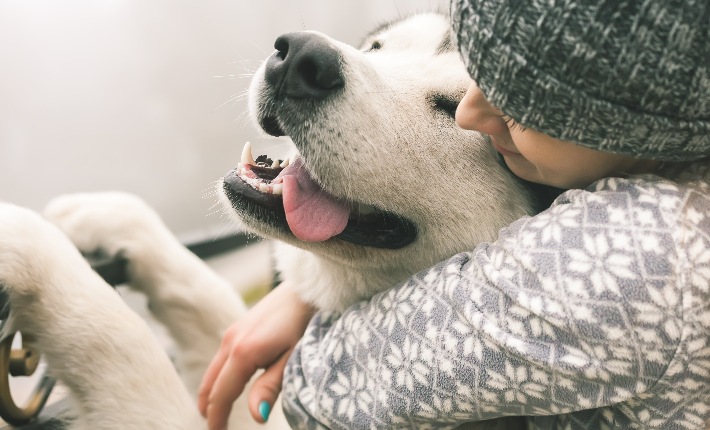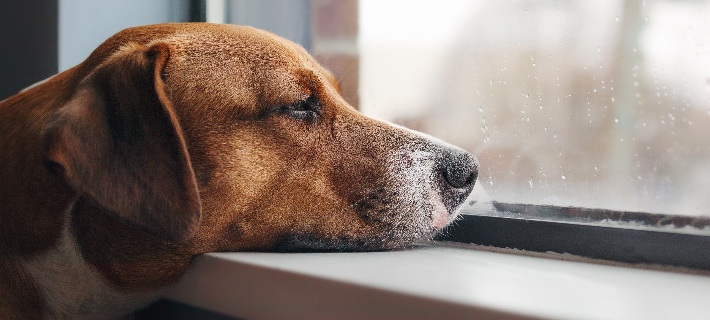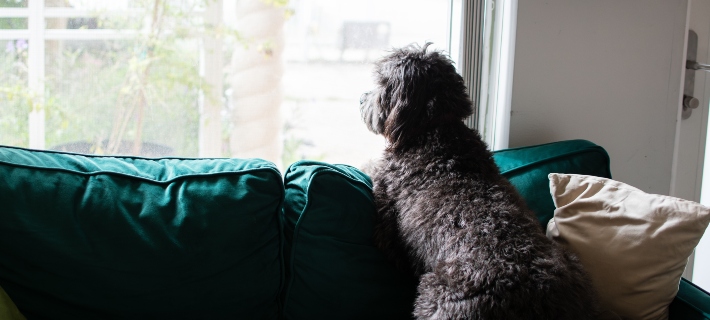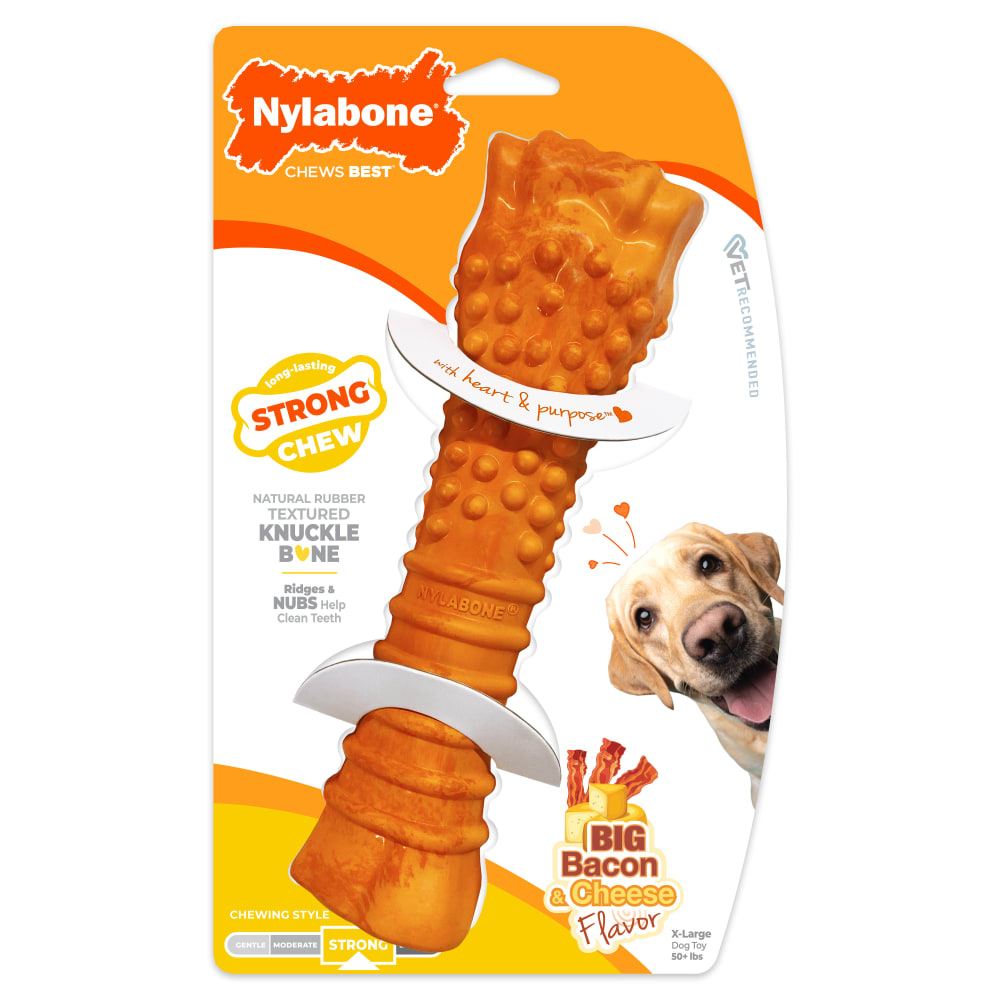Do Dogs Get Lonely? 5 Common Signs & 5 Ways to Help
From wagging their tail when you walk in the door to following you from room to room, dogs love to show their loyalty when their favorite person (we’re talking about you!) is around. As much as we want to hang out 24 hours a day with our best friend, the reality is all furry friends inevitably spend time alone. When you leave for the day, you might sometimes wonder, “do dogs get lonely?”
Yes, dogs can feel lonely, but there are many ways to help them overcome it!
Why Do Dogs Get Lonely?
Dogs are very social animals and have shared a special bond with people for generations! They’ve provided protection, companionship, and even hunting assistance to humans for thousands of years, according to an NPR interview with naturalist Mark Derr. He even believes it's the close relationship between humans and wolves that influenced the physical evolution of dogs.
Today, furry friends look to humans for comfort and safety, so it’s no surprise they might struggle without us around.
Is My Dog Lonely? 5 Common Signs
#1: Excessive Vocalization
Howling and barking are some of the more common ways your pooch might let you know they’re feeling lonely. You’ll likely notice barking or whimpering as soon as you leave your home or the area where your furry friend is. The next time you leave, wait outside the door for a few minutes and listen for howls. You can even set up a camera to check in on your dog’s behavior when you’re not around.
#2: Destructive Behavior
Chewing off-limits objects or urinating in inappropriate areas could be signs your furry friend is feeling lonely. Dogs will often behave in negative ways if they aren’t receiving enough socialization or feel isolated—especially because they know it’s a fast way to get your attention.
#3: Loss of Interest in Activity
Lethargy is one of the sneakiest ways dogs show signs of loneliness! If your pooch is sleeping more often than normal or showing little interest in activities they typically enjoy, it’s possible they need more social time either with you or other dogs.
#4: Change in Appetite
Changes in behavior, like a loss of appetite, can indicate a variety of potential concerns, including loneliness. The unsettling feeling loneliness causes may trigger a physical response, like a pup losing interest in eating or even feeling hungry at times that differ from their normal schedule.
#5: Separation Anxiety
Whether you’re out running errands or dropping your pup off at doggy daycare, there are various situations that can lead your pup to experience separation anxiety. If your dog struggles with separation anxiety whenever you leave, there’s a good chance they will feel prolonged loneliness while you are not with them.
While many dogs get sad when you leave, reach out to your veterinarian if your pooch appears to be in pain or unusually distressed.
🐶 Related: 5 Tips for Leaving Your Dog Home Alone

How to Manage Loneliness in Dogs
Not only is alone time beneficial for you and your furry friend, but dogs can even learn to enjoy the time apart! Here are a few ways you can keep your best friend feeling content throughout the day.
#1: Increase Quality Time Together
Dogs need socialization, and one of the best ways to do that is through bonding activities! You can try outdoor activities with your dog like walking and biking or adding training sessions to your routine. You don’t necessarily have to be together more often, but make sure you give your pup plenty of attention when you are around. Plus, a tired pup is likely to just sleep when you’re gone.
#2: Provide Mentally Stimulating Toys
Chewing is nature’s way of helping dogs cope with stress and boredom. When you get home after being out and can supervise your dog, give them a mentally stimulating chew toy to keep them happy and busy! Ensuring your pup is mentally occupied with a fun challenge will help distract them from those lonely feelings and focus their attention toward a positive activity instead. If your dog likes chewing, give them a chew toy as an outlet to release any built-up anxiety before you go.
#3: Create a Safe and Comfortable Space for Your Dog
Whether you’ve designed an entire dog room or use a crate for your pooch, make their environment feel like their home. If they feel safe and excited to spend time in their space, they’re less likely to feel isolated or lonely. Provide cozy blankets, a comfy bed, or even some extra relaxing dog-friendly music playing while you’re gone.
#4: Train Your Dog with Rewards
With the right training, it’s possible for dogs to enjoy spending time alone! As you start socializing your puppy when they’re young, also practice spending some time apart. As you prepare to leave, offer them a special reward, like a treat or a toy. Save the reward exclusively for this training activity so they feel excited when you start to leave. Practice leaving for a short period of time and then slowly increase the duration to ease the transition.
#5: Try Doggy Daycare of a Dog Walker
There are loads of options for pet parents who prefer someone to be with their companion during the day. Test out what works best for you and your dog, whether it’s a doggy daycare or a dog walker. You can even find a pet sitter you feel comfortable with watching your best friend while you’re away. If your dog gets along with others, ask a neighbor or friend to spend some time with them.
Giving your dog a lifelong friend is also an option if you’ve ever considered adding another pet to your household!
Related: 10 Dog Breeds That Get Along Well with Cats

Keepin' Your Canine Company
Although dogs get lonely at times, raising an independent pooch will help you and your furry friend live a well-balanced lifestyle. As time apart starts feeling more comfortable and secure, every bonding session with your dog will be even more special than before. Plus, there’s nothing better than seeing the joy on your best friend’s face when you reunite!
“Is my dog lonely?” is just one of many questions pet parents ask. Find the answer to more popular dog questions!
FOLLOW US!






